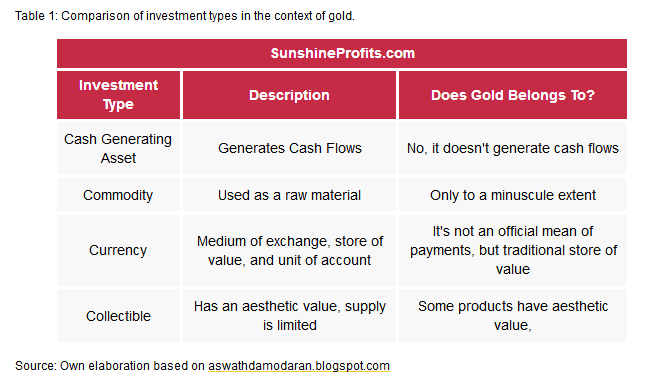What is Bitcoin? Is it just a payment system, money or investment asset? Nobody knows for sure – it generates enormous definition and classification problems. But it’s understandable, as Bitcoin in a new player in town. However, people also cannot agree on what gold really is. Let’s solve this problem once and for all. It will enable us later to adopt the right gold investing philosophy.
Have you heard about Aswath Damodaran? You probably have, as he is a guru of fundamental valuation. So he classifies investments in four broad categories:
- Cash generating asset – it’s an investment which generates or is expected to generate cash flows in the future. Here you can find businesses, stocks (residual cash flows), bonds (contractually set cash flows), real estate (one can rent them), or even options (contingent cash flows).
- Commodity – it derives its value from its use as raw material to meet a fundamental need, whether it be energy, food or shelter. Think about oil, copper, soybeans, etc.
- Currency – it’s a medium of exchange, a store of purchasing power and a unit of account that you use to denominate cash flows and is a store of purchasing power. The U.S. dollar and the euro are definitely currencies.
- Collectible – a collectible has no cash flows and it is neither a raw material nor a medium of exchange. Instead, it can either have aesthetic value (think about Picasso’s paintings) or an emotional attachment (baseball cards). Its supply is limited.
So what is gold? Let’s start with answering what it definitely is not. Gold doesn’t generate any cash flows itself (unless it is lent out, but it’s something different then), so it’s not an asset such as shares or bonds. There are two consequences of that. First, without cash flows gold cannot be valued using standard valuation methods, such as DCF and so on. Second, gold doesn’t behave similarly to other assets, so its correlation to them is very low, hence it may serve as a portfolio diversifier.
OK, gold is not a cash generating asset. So – as a metal – it must be a commodity, right? Well, it’s true – but only partially. Gold has some industrial utility, that’s for sure. However, the technology demand is limited. According to the World Gold Council’s data, it accounts only for about 17.5 percent of the total demand for gold. But we know that the demand for gold is actually much bigger, as the WGC focuses on annual flows, neglecting the massive stocks of gold and the fact that the gold’s demand and supply comes from the marginal buyers and sellers who hoard a lot of bullion. Hence, gold is a commodity only in a minuscule part – it implies that we cannot value it as copper, just looking at the annual balance between production and consumption.
We get it. Gold is neither an asset, nor a commodity. So it’s practically useless, or it is a collectible, at best? Surely, some gold investment products can have aesthetic or emotional value (think about grandma’s jewelry or some rare coins). And one can argue that the value of gold is created only by its scarcity and expectations of future investors pricing it more highly than we do now, just like collecting baseball cards or stamps. However, this is not the distinguishable feature of the collectibles, but of other investments (why do people buy stocks which don’t pay dividends?) – and the media of exchange as well. Moreover, for most investors, aesthetic features of gold don’t matter – only its monetary aspects are relevant.
Indeed, we accept something as a medium of exchange, based on expectations that people will accept in the future, so it must retain its purchasing power. And here is where gold enters the scene. It’s true that the shiny metal doesn’t serve officially any longer as money. But it doesn’t mean that it lost its economic features or that investors stopped perceiving it as a reliable alternative to fiat currencies. As Damodaran said, gold’s value has “more to do with its longstanding function as a store of value, especially during crises or when you lose faith in paper currencies, it is more currency than commodity.” The comparison between the four basic types of investment with reference to gold is presented in the table below.

Gold is a special kind of currency (it is a bet against the U.S. dollar). This is what we have been repeating for a long time (for example, you can check out the July 2015 edition of the Market Overview), but that simple message has not yet reached all investors. So they commit the same mistakes all the time. They focus on irrelevant factors, such as mining dynamics. Or they listen to Warrant Buffet and don’t own any gold. He has the right: gold is neither an industrial commodity, nor an asset generating cash flows. But so what? It’s like complaining to the lion that it’s not an elephant or a giraffe! So please remember one of the most important lessons about the yellow metal’s fundamentals: gold is more currency than commodity.
